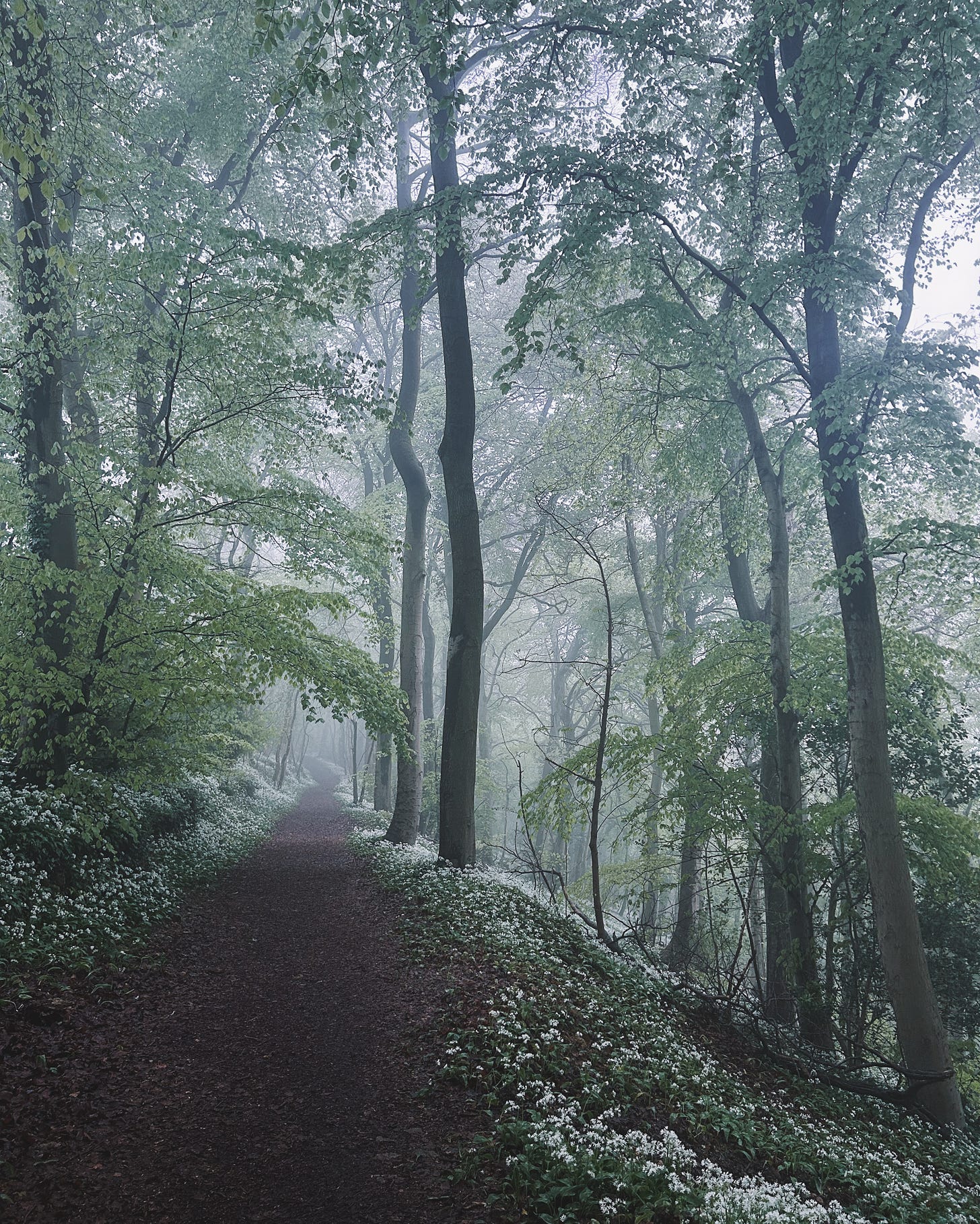becoming invisible
I watch dawn light shimmer between the trees and let the moment envelop me
I wish I could bottle the feeling of a foggy May morning: damp air thick with the blended scent of cow parsley and wild garlic, so sweet, strong and spring-like that I breathe huge gulps of it as medicine. The lane that leads up to the woods is lined with flowers—raggedy, drip-heavy heads of cow parsley; shining yellow buttercups; sparkly dandelion globes and stray pink dots of campion emerging from the hedgerow. I hear wing beats and a crow flies across the path, over the cloud of cow parsley and into the fog. Stepping between the trees, I catch the fresh scent of new nettles.
I am the only human soul in the woods. Above my head, feathery, vivid green leaves; beneath my feet a path thick with mud—churned by the passage of many soles over the bank holiday weekend. It’s not yet six o’clock in the morning and the only footsteps now are my own. I walk gingerly, leaf mulch weighing down my canvas pumps—in my hurry to tiptoe out the house without waking my family, I forgot my boots. Baby-soft beech leaves brush against my face, washing it with morning dew.
A fine silvery mist tangles through the trees, quickening the air. Below the branches, star-bright wild garlic floods down the slope, flowers shining white. I am alone, but this place is neither still nor silent—a dawn chorus of birdsong rises, chirrups and trills—the woods are alive, alive, alive. Voices of song thrush, nuthatch, blackbird, blue tit, robin and wren spiral around me with the mist.
Yesterday, on the way to visit a friend, I passed by the edge of the woods in sunshine. Then, the lane and lay-by were overflowing with cars, busy with visitors and day-trippers flocking to the flowers—wild garlic and the last of bluebells. Now, even the dog walkers are still in bed and there is no-one here but me. I think, suddenly, of the Mary Oliver poem How I go to the Woods.
‘Ordinarily, I go to the woods alone, with not a single
friend, for they are all smilers and talkers and therefore
unsuitable.’
I pull my phone out of my pocket, search it up and begin to read the poem aloud to the trees like an incantation: ‘I have my way of praying, as you no doubt have yours’, I read, my voice trembling through silver air. ‘When I am alone I can become invisible.’
I finish the poem but the trees do not reply, only swish bright leaves under their misty covering. The birds sing on, and in the valley below I hear the bleating of a lamb. All around me, water droplets fall onto shiny wide blades of garlic. I watch dawn light shimmer between the trees and let the moment envelop me, as if my body could melt into mist until I fade—invisible—into the air.
Afterwards, weaving my way back through foggy lanes, I pass a field of yellow rapeseed, a tide of luminous flowers that glow against grey. A blackbird sits on a fencepost, his beak as yellow as the blooms. The way forks, and although the mist beckons me on, I take the road that leads to home, where my boys are still sleeping and I will climb under the covers with my husband, petals in my hair and feet still wet with dew.
Thank you for reading,
Laura
If you enjoyed this post, you may also enjoy my upcoming book, Chasing Fog.
PS: You can read the full poem here and watch a tiny snippet of video from the woods below.






Thank you! I felt like I was right there. I became disabled 10 years ago at age 65 and what I miss most is being alone in the woods. You captured the feeling so beautifully it brought tears to my eyes. Thank you again.
I know we live on different patches of the planet, but I feel we might be walking sister woodlands early in the morning as our loves sleep on. Gorgeous piece, thank you 🙏🏽🤗💜